Do you sometimes find yourself thinking 'There are just too many guitar chords!'?
We feel your pain!
However, learning new guitar chords is beneficial: it keeps your rhythm playing fresh, and really helps when you are searching for inspiration for songwriting and composing.
There are shortcuts that you can use when learning new chords: in this article we show you how you can learn two new chords for the price of one!
Major 6th Chords On Guitar
6th Chords, both major 6 and minor 6, are useful chords to know. They have a slightly more interesting sound than their standard major and minor counterparts, and can usually be freely interchanged with them.
For example, try playing a basic C major progression such as:

Then, substitute the major chords with 6th chords, using the chord shapes shown:
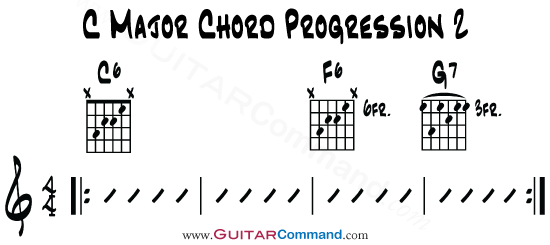
The 6 chords make the progression sound a little less 'basic'. Major 6 chords don't sound as immediately 'happy' or as 'open' as major chords. They have a more ambiguous sound.
Chord Synonyms
In this article we're going to be looking at chord synonyms. This means different chords that contain the same notes.
Major 6 Chords
In theory, sixth chords contain four notes. These are: the root, third, fifth and sixth notes.
In a major 6 chord, the third is a major third.
Therefore, a C6 chord contains the notes: C (root), E (third), G (fifth) and A (sixth)
Written out it looks like this:
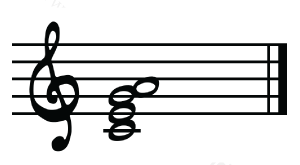
Note: chords don't have to be played with the notes exactly in this order. In fact, they don't always have to contain all of the notes. Notes can be doubled, and unimportant notes can be omitted entirely. The bass note of the chord does not necessarily have to be the root note (i.e. in a C6, the bass note doesn't have to be a C).
Here are two ways of playing a C major 6th chord.
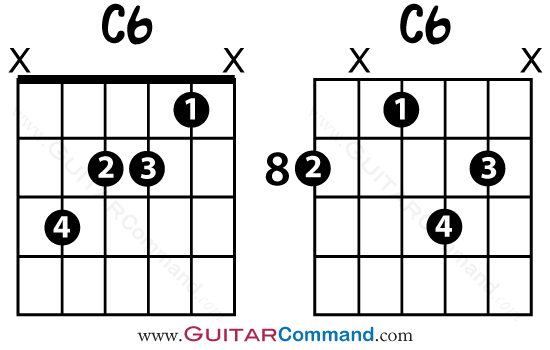
Major 6 Chord Synonym: Minor 7
We have seen that the C major 6 chord contains the notes C, E, G and A.
Another chord that contains exactly the same notes is A minor 7.
Starting from the root note the notes are: A (root), C (third), E (fifth) and G (seventh).
This means that if you learn a major 6th guitar chord shape, then you have also learned a minor 7th chord shape ... and vice versa.
Depending on the chord shape, it may sound more like a major 6th chord, or a minor 7th chord, but the fact remains that they are the same chord.
It is the bass note that usually gives the chord either a major 6th or a minor 7th sound.
Below are 2 ways of playing Am7 on guitar:
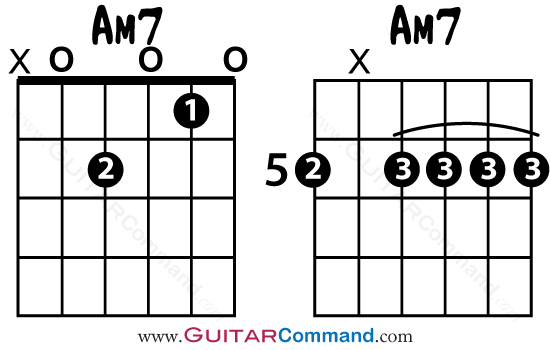
If you are playing in a band, and the bassist plays a C root note, then you could play an Am7 chord over the top and it would sound like a C major 6th chord: the bassist would be providing the root note.
The takeaway is:
Any major 6 chord contains the same notes as the minor 7 chord with a root a minor 3rd lower.
Any minor 7 chord contains the same notes as the major 6 chord with a root a minor 3rd higher.
Learning Guitar Chords
It's one thing getting to the end of an article like this having played a few new guitar chords, but another to actually absorb these new chords so that they are at your disposal whenever you need them.
The only way to complete the learning process is to use any new chords that you learn. Drop them into existing songs, use them to write new songs: make a conscious effort to use them over a few weeks. You'll be surprised how quickly your chord knowledge grows.

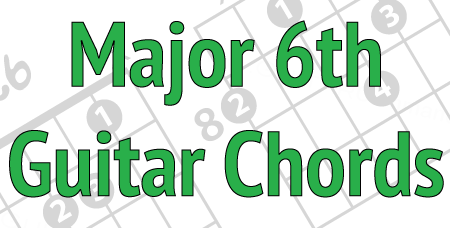

There is an error in the section that describes the A minor 7 chord………the G is the listed as being the 6th when in fact it is the 7th.
Major 6 Chord Synonym: Minor 7
We have seen that the C major 6 chord contains the notes C, E, G and A.
Another chord that contains exactly the same notes is A minor 7.
Starting from the root note the notes are: A (root), C (third), E (fifth) and G (sixth).
Good spot, thanks Gary! This has now been fixed.
interesting, thanks